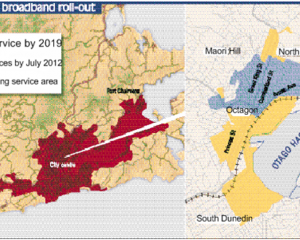The Telecommunications Users Association chief executive, Paul Brislen, favours the five-year deferred payment option for successful bidders for the digital part of New Zealand's radio spectrum.
He had earlier pushed for no auction at all.
''We'd rather see a beauty pageant approach - that is, we've got three network operators and 45MHz of spectrum, so 15MHz each. That would avoid them spending money on a piece of paper rather than the network itself.''
The deferred payment option was sensible given it would probably take several years to get a 700MHz network up and running with end user devices, he said. The price should be low enough so network operators did not find themselves unable to deploy their networks once they had won the spectrum rights, Mr Brislen said.
Communications and Information Technology Minister Amy Adams announced on Wednesday the allocation of the 700MHz band of spectrum would allow the building of fourth generation (4G) mobile networks using the spectrum freed up by the switchover to digital television.
The auction would start on October 29 with the start date confirmed after completion of the bidder registration process.
The reserve price of each of the nine lots had been set at $22 million. The Government had spent $157 million clearing the band to allow the spectrum to be used for 4G mobile networks, she said.
''In setting the reserve price, we have balanced generating a fair return on the sale of the spectrum rights with the significant investment required by mobile network operators to build the 4G infrastructure.''
The reserve price also took into account the value to New Zealand of having 4G connectivity widely deployed.
Allowing a staged payment over five years would enable mobile network operators to invest immediately in building their 4G networks to increase their service to New Zealanders, Ms Adams said.
Mr Brislen said Tuanz would watch the auction closely to ensure the larger players did not make life costly for new entrant 2degrees.
The Government had signalled in an early discussion document it would be happy to see two players buy 20MHz each should one player drop out.
''That's unacceptable to us and to the New Zealand customers, all of whom remember life under the cosy duopoly. We need to have three network operators in order to make sure we have decent pricing,'' he said.
Telecom said in a statement it intended to be a bidder in the forthcoming auction. But the company warned the deployment of the spectrum into Telecom's 4G LTE network would depend on handset availability. Indications were that suitable devices would start becoming available from mid to late next year - at the earliest.
Mobile phone operator 2degrees questioned the Government's minimum reserve price of $198 million for the 4G mobile spectrum, saying it was well above prices being paid for existing spectrum.
''The spectrum's been priced at a premium to the $157 million cost of clearing the band, well ahead of Treasury's $119 million valuation and about double the price we paid recently for 15MHz of 1800MHz spectrum,'' said newly confirmed 2degrees chief executive Stewart Sherriff in an emailed statement to BusinessDesk.
Labour Party communications and IT spokeswoman Clare Curran said the spectrum auction was being rushed.
''The last thing we want to see is this opportunity squandered and some spectrum left unsold, as happened in Australia.''



